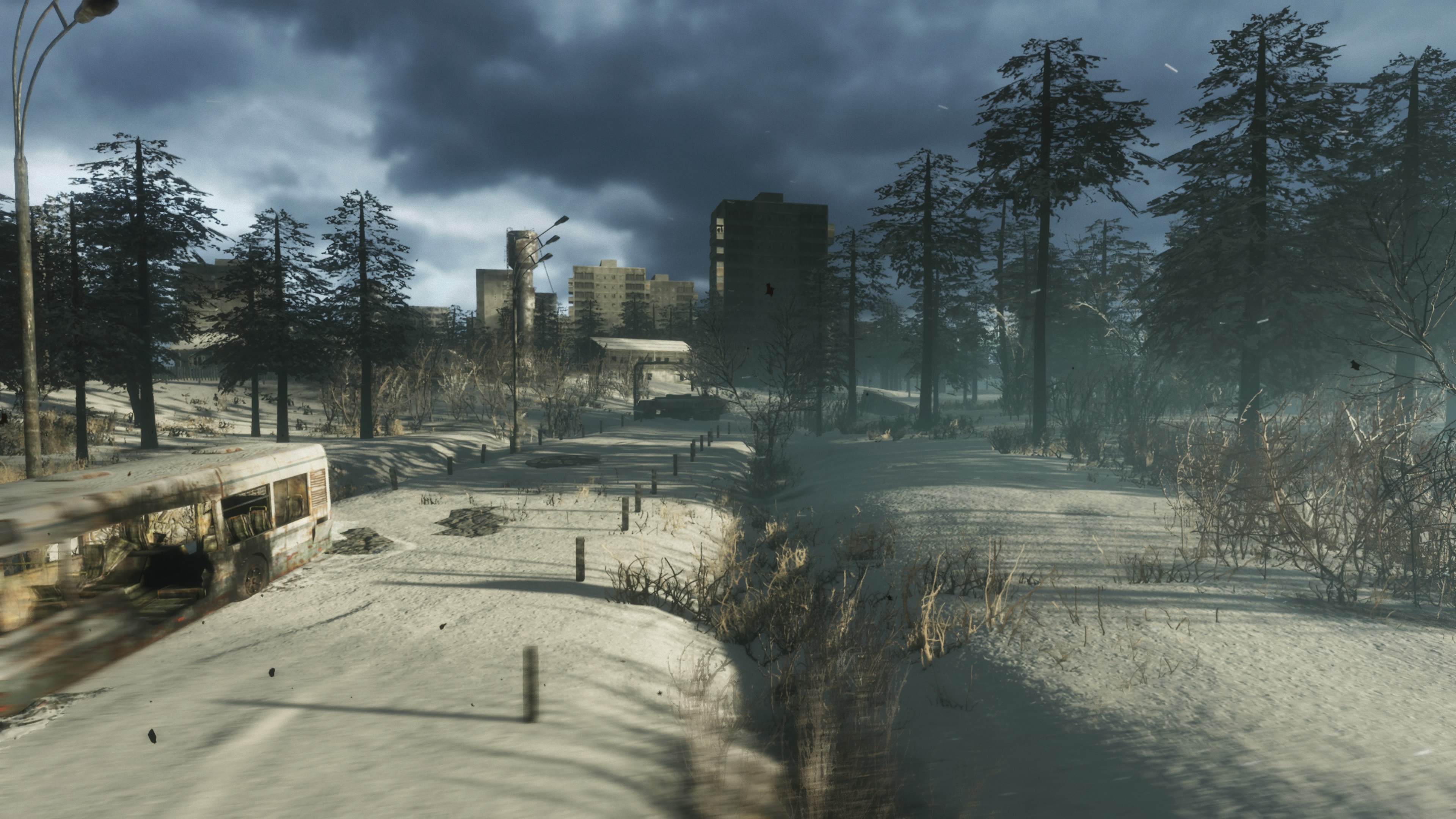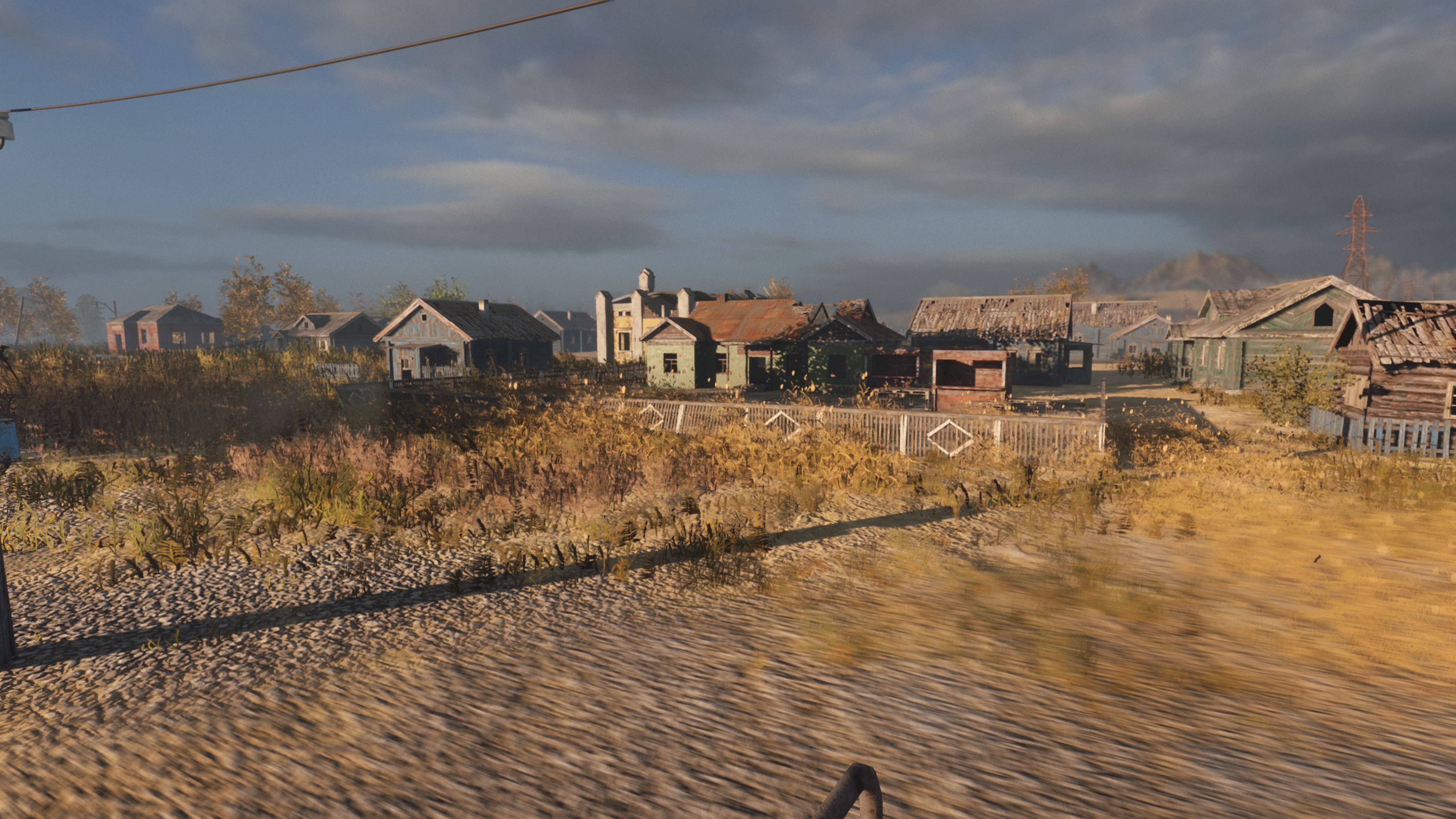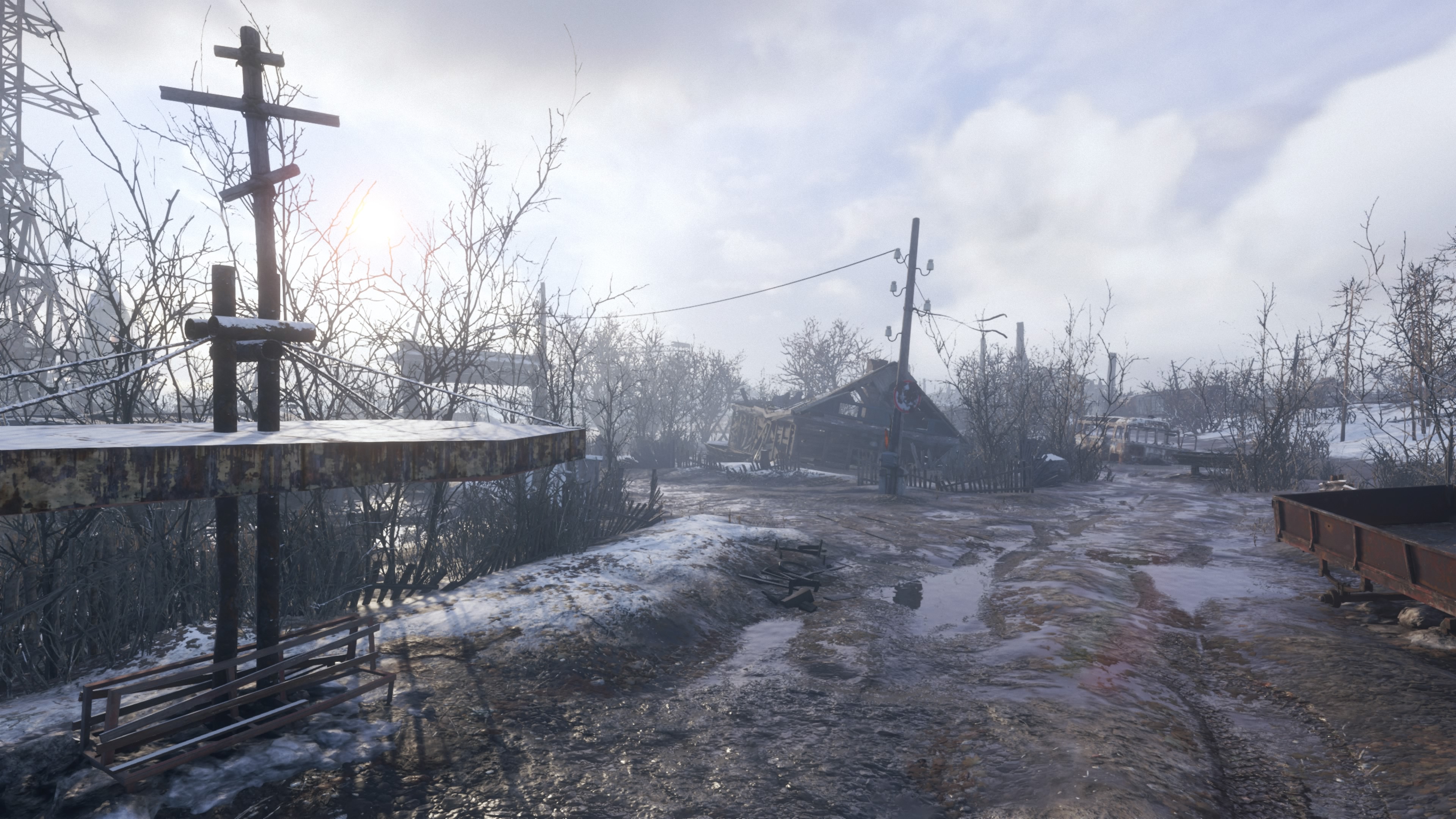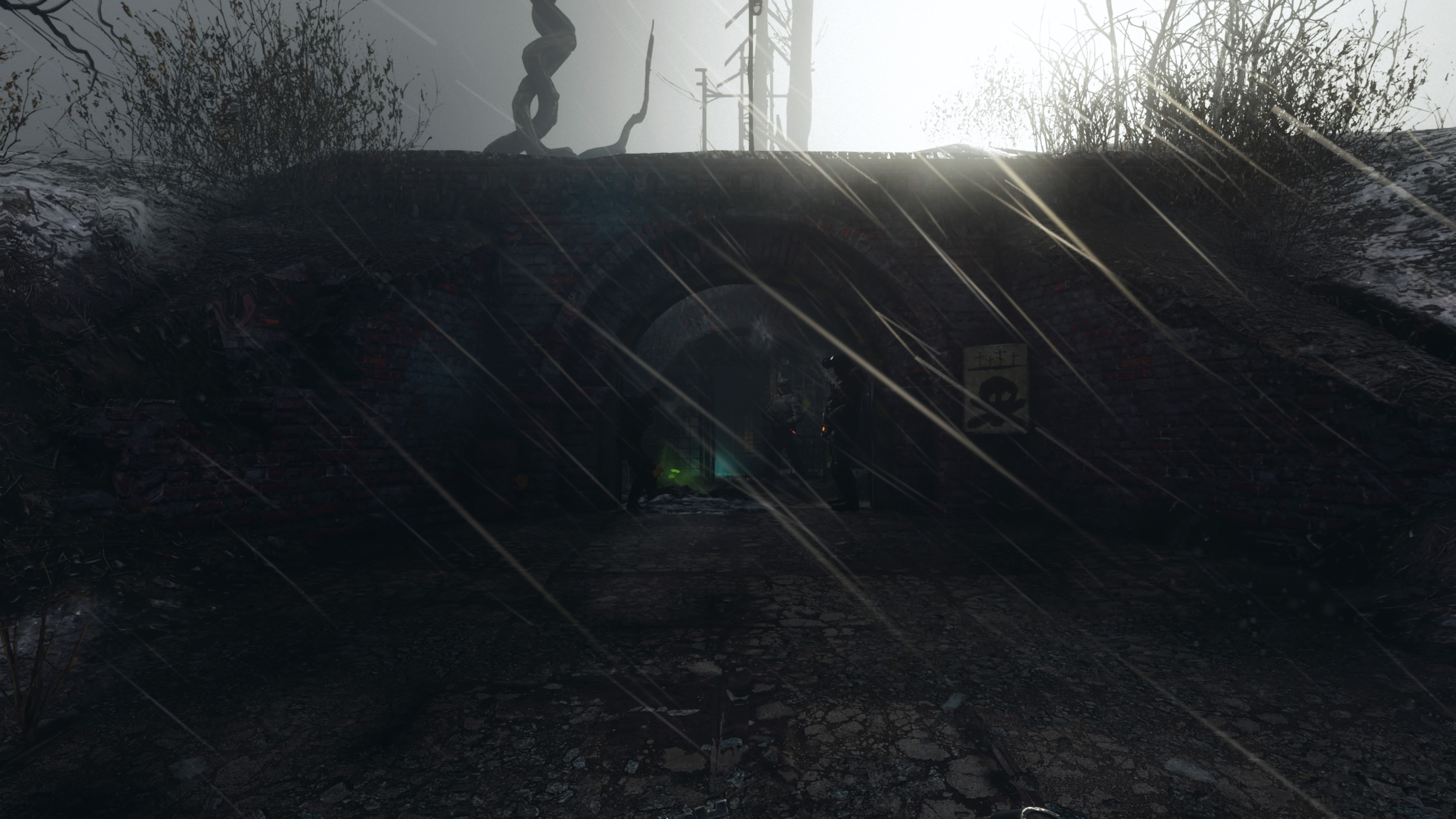Metro Exodus's miserable landscapes put other modern open worlds to shame
A tribute to fear and detail.

I commute up to four hours a day but I’ll never get tired of being on trains. During the opening hours of Metro Exodus, when Artyom and his Spartan Ranger pals have finally boarded the good train Aurora, I stare out the window while the bigshot commander guy rattles off his commands. Outside, the ruins of village houses and rural bus stops fly by, the sky is a morose dark grey. I want to take a seat: this is heaven for me.
When the commander has stopped barking I flee the cabin and stand on the outside deck. Gutted orthodox churches and crumbling tower blocks dot the landscape. Electricity towers sprout from the charred brown shrubbery. I wait, anticipating the moment when this handmade landscape will loop back onto itself. And it does: there’s the orthodox church from before, there’s the Cyrillic-festooned bus stop again. I enjoy this confirmation that I’m inside a videogame, just as much as I marvel at the version of reality it’s striving to depict. I keep watching: I’m in my element. I love trains.

I also loved the suffocating, hellish mood of the previous two Metro games, which were set for the most part in underground tunnels. But as soon as the Aurora pulls up at the banks of a ruin-strewn Volga, I’m convinced that “hellish” and “suffocating” are both characteristics 4A Games doesn't intend to lose. From the railway ridge overlooking the river and its surrounds, evidence of ramshackle apocalyptic settlements and oversized mutant crab creatures assure me that all is right in the world.
No Bandit’s Playground
Metro Exodus has several open worlds, and each one is better than any other open world I’ve explored in recent times. The areas in Exodus are dangerous, alive with snakes and mutant flying mammals, riddled with crawl spaces that descend into labyrinthine underworlds. Then there’s the weather: the horrible radiation storms, the blinding dust. I have a map but it’s vague, aside from the X mark that indicates where my next mission objective is. I’m allowed to go wherever I want, but crucially, I kinda don’t want to leisurely explore. Occasionally I’ll deviate 100 metres in order to loot a ruined shack for crafting materials. But I’ll only do so after careful deliberation: Can I afford to waste my ammo? Will I need to use my gas mask? Am I going to be able to get back easily? And for that matter, how will I get to my objective? I can’t just make a beeline.

This open world stretch of the Volga could probably be traversed in about five to ten minutes for lack of any danger: it’s not a massive area. But it feels massive. Just over there, a vast train yard is clogged with abandoned carriages, and over in the other direction, a buckling crane lay dormant above a yard of shipping containers. To get from one to the other is a mission in itself. I cannot fast travel. I cannot sprint endlessly. Metro is adamant that I slow down. It’s just as “hellish” and “suffocating” as I had hoped, but importantly, it lavishes detail at every obscure juncture of the map. I feel like this is the real goal of 4A Games: this studio is much more concerned with world building and mood than it is the moment-to-moment gun feel. It’s painterly, it’s utterly enveloping. I’d be having just as much fun if I didn’t have a gun and things to kill.
Despite the huge expanse of your Just Causes, your Assassin’s Creeds, your Far Crys, there’s zero likelihood that I’ll ever get lost
I know I’m not alone in feeling ambivalent towards the typical videogame open world. Though not a stickler for realism, I’m never made to feel endangered as I sprint across Far Cry 5’s bizarre cultist-operated Montana. If something goes wrong I know I can simply run away, jump into a nearby car and probably fire off a few playful salvos during my escape. Also, despite the huge expanse of your Just Causes, your Assassin’s Creeds, your Far Crys, there’s zero likelihood that I’ll ever get lost. Rather than carefully descend a heaven-scraping mountain in Assassin’s Creed I can simply jump off the bloody thing. I won’t even die. In my opinion, that sucks. It erodes the sense of adventure: there are few places in modern open world games that are hard to get to.
Keep up to date with the most important stories and the best deals, as picked by the PC Gamer team.

I thought the days of being awed by open worlds had come to an end for me. When I look at the sheer abundance of the landscapes in most modern game worlds, it’s more likely to elicit exhaustion rather than amazement. The world of Just Cause 4 feels just as haphazard and random to me as a No Man’s Sky planet: four distinct biomes jarringly stitched together, an over-abundance of foliage, a bunch of illogical roads and oddly placed industrial buildings. It’s a playground, not a world, and that’s fine. Most modern open worlds are like this: chock-full sandboxes of repeatable mini-games intercut with occasions of action film theatricals. They’re built for “fun”, they’re not built to transport the player into a different alternative world.
But Metro is defiantly the opposite. While there are “side-activities”, they’re expertly interwoven with the pressing narrative at hand. Everywhere there exists one-off relics of the past: Soviet mosaic art, complex and inscrutable industrial remnants, remote shacks with telltale signs of recent inhabitants (that you won’t find 20 times over—looking at you Far Cry 5’s bunkers). It’s possible that many players have been conditioned out of paying close attention to their surroundings, but in order to make the most of Metro, you simply must. It may be completable in 20 hours, but you’re rushing if it takes any fewer than 50.
Other games do this well: Dishonored 2, Deus Ex: Mankind Divided, the Yakuza series, not to mention Half-Life 2 and Crysis. But it feels like scale and surplus of content has detrimentally affected the sense of adventure in most blockbuster open worlds. Metro Exodus's celebration of detail, and its insistence that the player take their time, is a welcome breath of fresh (albeit possibly irradiated) air.

Shaun Prescott is the Australian editor of PC Gamer. With over ten years experience covering the games industry, his work has appeared on GamesRadar+, TechRadar, The Guardian, PLAY Magazine, the Sydney Morning Herald, and more. Specific interests include indie games, obscure Metroidvanias, speedrunning, experimental games and FPSs. He thinks Lulu by Metallica and Lou Reed is an all-time classic that will receive its due critical reappraisal one day.

